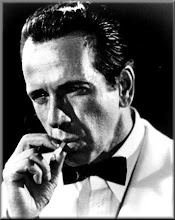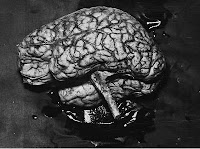There is another patient who is less famous, known the by initials H.C. He died in 1939 when H.M. was just entering adolescence. Unlike H.M., this patient did not undergo radical resection surgery. In fact, he never underwent brain surgery at all. His contribution to neurology did not begin until after his death at the age of 76.
In what was supposed to have been a routine autopsy, H.C. was discovered to have had no cerebellum (see pictured brain above). H.C. had a very rare neurological condition known as cerebellar agenesis. When I was in graduate school, I was taught that the neuroplasticity of the brain was so remarkable, that even a child born without his or her cerebellum could grow-up to have no deficits and live a normal life. As it turns out, that was only partly true. H.C. was in fact, not without deficits. His tale is recounted briefly in two articles from the March 2010 issue of Brain:
"It was clear that there were indeed clinical signs included right external strabismus (i.e., misaligned eyes), slow and slurred articulation and an unsteady gait." (1)However, he did live a "normal life":
H.C. "had employment, that he was able to work in a manual job and that his working life was not curtailed by his cerebellar agenesis." (1)What is interesting about H.C. compared to H.M., is that H.C.'s agenesis was discovered only after he died. Very little clinical history about his life exists, making this story a great neurological detective case. Most of what is known about H.C. comes from hospital notes during his last years of life, just before he developed dementia:
"The social history describes him as 'single.' The notes contained a record of his assessment by a neurologist, Dr. Jacobson, who described him as 'a simple man with some hearing loss and slow slurred speech; he has a fair memory for recent and remote events concerning himself, but with limited general knowledge. There is no hallucination or delusions nor emotional defect. He is clean in his habits and able to attend to his person. He is able to get around unassisted." (1)The human brain is estimated to have approximately 85 billion neurons (2). The cerebellum, which is typically 1/4 the size of the rest of brain, contains a full 50% of all our neurons. If you pay close attention to the image above, you will notice that, in addition to not having a cerebellum, H.C. was also missing his pons, the bulbous structure that is typically adjacent to the cerebellum and is responsible for arousal and alertness.
Many of the patients I have seen with cerebellar strokes typically have severe and irreversible deficits. While H.C. did have some cognitive and functional deficits, that he lived a full and functional life is nothing less than remarkable. His case is an example of how extraordinary the human brain actually is.
I encourage you to read more about the mysterious case of H.C. here.
Boyd, C. (2009). Cerebellar agenesis revisited Brain, 133 (3), 941-944 DOI: 10.1093/brain/awp265
Lemon, R., & Edgley, S. (2010). Life without a cerebellum Brain, 133 (3), 652-654 DOI: 10.1093/brain/awq030





8 comments:
Hi -
Other than the name MacGuffin at the top of the page, I've no idea who wrote this blog. I would like to get more references on cerebellar strokes because I have a brother who had a major cerebellar stroke. Blew it out basically. Slept for 2 years then seems to have awakened. I am a physiologist (non-practicing) who specialized in cardiac phyz - I know just enough to make me insane as I try to figure out what to do to stimulate his brain/nerves/muscles. Any referrals to research are helpful. This blog was helpful.
Thank you - Gay Timmons gayt@mac.com
That's a really interesting case... especially because there used to be a theory (maybe there still is) that autism is associated with cerebellar dysfunction. On the grounds that it's associated with clumsiness, and there's some subtle neuropathology too I believe. I wonder if HC was autistic? It doesn't sound like it, but the description is very brief.
Interesting story on the same subject.
http://www.aolnews.com/2011/02/12/chase-britton-boy-without-a-cerebellum-baffles-doctors/
Clintworth, your story is an inspiration.
Really helpful information u mentioned in your blog. Thank you for the post.
I have a Brother who has no cerebellum and has been studied at Harvard by Dr Jeremy Schmahman.
The results of the 8 person study will be published sometime next year.
It will be a ground-breaking study and is being used as a preliminary study to fund a larger one.
My Brother is the oldest at 62, one in the study is 5 yrs old and several others have college degrees!
I have a son who is a twin. He was the donor as they developed ttts at 20 weeks. We had laser ablation to save their lives. It worked. The both made it, however, the donor sustained a cerebral injury resulting in only 10% of it actually developing. Can you guys contact me. I would greatly appreciate any knowledge, advice, on how to help him. We currently have him in physical therapy. Todayi he is 6 mos old.
I have cerebellum agencies, I was diagnosed when I was 3 and the doctors told my mom I was never gonna walk, talk, or anything. I am now 35 married with 2 kids
I have cerebellum agenises I was diagnosed at age 3 the docs said I would never walk or talk or anything however I did walk at age 6, I am now 35 married and have 2 kids.
Post a Comment